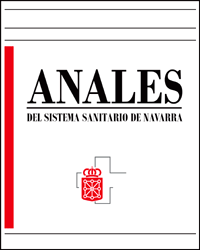Situación cognitiva como condicionante de fragilidad en el anciano. Perspectiva desde un centro de salud
Palabras clave:
Anciano. Anciano frágil. Atención Primaria. Deterioro cognitivo. Mini examen cognoscitivo..Resumen
Objetivo. Conocer la influencia del estado cognitivo en la presencia de diferentes factores de fragilidad en el anciano. Material y Métodos. Estudio en una población anciana ambulatoria con enfermedades crónicas (domiciliarios e institucionalizados), la presencia de diferentes factores de riesgo de fragilidad y su relación con el estado cognitivo (valorado mediante el mini examen cognoscitivo –MEC–). Resultados. Estudio de 147 ancianos con una edad media de 71,4 años y proporción similar de hombres (74; 50,3%) y mujeres (73; 49,7%). Treinta y cuatro sujetos (23,1%) institucionalizados en residencias. El porcentaje de pacientes que presentan un deterioro cognitivo (MEC<24 puntos) es de un 12,9% (19 casos). Presencia de factores de riesgo de fragilidad: soporte social deficitario: 7,5% (11); caídas: 17% (25); incontinencia urinaria: 18,4% (27); depresión: 13,6% (20); ansiedad-insomnio: 29,9% (44); hospitalización-reingresos: 21,8% (32); polimedicación (>3 fármacos): 53,7% (79); pluripatología (³3 enfermedades): 36,1% (53). Los factores de fragilidad que tienen una relación significativa en pacientes con deterioro cognitivo (MEC<24) son caídas [OR=59,5 (IC 95%=14,7-240,6)] (p<0,0001), incontinencia urinaria [OR=31,2 (8,9-109,1)] (p<0,0001), hospitalización-reingresos [OR=32,9 (8,6-125,8)] (p<0,0001) y depresión [OR=7,8 (2,5-23,5)] (p<0,0001). Respecto a la puntuación del MEC por percentiles, los factores de riesgo que muestran una tendencia de aparición lineal son las caídas (p<0,0001), incontinencia urinaria (p<0,0001), hospitalización-reingresos (p<0,0001) y pluripatología (p=0,002). Conclusiones. El deterioro cognitivo marca la aparición de forma significativa de factores de fragilidad en el anciano como las caídas, incontinencia urinaria, hospitalización-reingresos hospitalarios y depresión. Esta relación no sólo se aprecia en los pacientes con un deterioro cognitivo establecido (MEC<24 puntos), sino que además hay una tendencia de aparición según progresa dicho deterioro, con una relación estadística para las caídas, incontinencia urinaria, hospitalización-reingresos y pluripatología.Descargas
Descargas
Publicado
Cómo citar
Número
Sección
Licencia
La revista Anales del Sistema Sanitario de Navarra es publicada por el Departamento de Salud del Gobierno de Navarra (España), quien conserva los derechos patrimoniales (copyright ) sobre el artículo publicado y favorece y permite la difusión del mismo bajo licencia Creative Commons Reconocimiento-CompartirIgual 4.0 Internacional (CC BY-SA 4.0). Esta licencia permite copiar, usar, difundir, transmitir y exponer públicamente el artículo, siempre que siempre que se cite la autoría y la publicación inicial en Anales del Sistema Sanitario de Navarra, y se distinga la existencia de esta licencia de uso.








